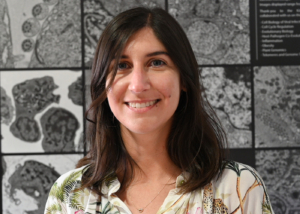Two new ERC Starting Grants for the IGC
Three groundbreaking projects from Portugal in Life Sciences have been chosen, securing a total funding of over €5M.
The distinguished recipients from Portugal are Giulia Ghedini and Ilana Gabanyi from the Gulbenkian Science Institute (IGC) and Carlos Minutti of the Champalimaud Foundation. The principal investigators will be granted between €1.5-1.9M each to develop their research proposals over the next five years.
For 2023, the ERC Scientific Council earmarked a budget of €628 million to support over 400 Starting Grants spanning various research fields, including the Life Sciences, attracting over 2,500 applications. In Life Sciences, 110 proposals were selected for funding out of 735 submitted proposals.
The ERC Starting Grants aim to empower outstanding Principal Investigators who are embarking on establishing their independent research teams or programmes. To be deemed competitive for the Starting Grant, a Principal Investigator must not only present an innovative, ambitious, and viable scientific proposal but also exhibit signs of research autonomy and maturity (e.g., authoring a significant publication either as the primary contributor or without the involvement of their PhD mentor).
Giulia Ghedini says, “I am beyond thrilled to receive this grant. It opens prospects for research and collaborations that I would not have been able to achieve otherwise. I am particularly ecstatic about being able to do my dream project, and I look forward to the years of research ahead and the opportunity to assemble a fantastic team to do it!”.
For Ilana Gabanyi, “starting a lab can be overwhelming; getting the ERC Starting Grant not only gives you the funding to do what you dreamed of doing one day but also shows that you are in the right direction. A powerful combination that motivates you to do great science”.
About the IGC winning projects
Giulia Ghedini, Gulbenkian Science Institute

Mapping metabolic responses to understand coexistence and community functioning – META_FUN
Although research has already revealed that the metabolism of organisms affects the productivity of populations and communities, the relationship between organismal metabolism and species interactions has yet to be explored. Hence, predicting the rates at which entire communities flux energy and resources remains difficult. Giulia´s previous work shows that the metabolism of organisms measured in isolation does not reflect their performance in communities because species interactions alter how organisms uptake and expend resources. Understanding how such interactions affect metabolism is essential to estimating productivity and how it will change with biodiversity loss and global warming. Giulia’s ERC Starting Grant-funded project proposes to use marine phytoplankton as a model laboratory system to determine how metabolic responses to competitors affect coexistence and community functioning. The goal is to connect metabolic theory, which studies physical constraints on the metabolism of organisms in isolation, with community ecology, which centres on species interactions and emergent community properties. Based on Giulia´s preliminary data, the researcher will map metabolic responses between species that compete for similar resources and test whether these responses stabilise coexistence. The project will allow Giulia and her team to leverage developments in transcriptomics of non-model organisms to identify the metabolic pathways that underpin metabolic responses. From this basis, the project will extend the analysis on larger temporal and biological scales, determine how warming modifies metabolic responses and community productivity, and how metabolism evolves in communities. Altogether, this project will demonstrate how metabolic adjustments influence the diversity and functioning of communities. The results will have broad implications for understanding biological systems because the metabolic impact of species interactions shapes the physiology and evolution of all organisms.
Ilana Gabanyi, Gulbenkian Science Institute

Trafficking mechanisms and physiological factors mediating a direct gut microbiota-brain neuron interaction – MicrobiotaNeuroTalk
The gut-brain axis has emerged as a complex regulator of system-wide physiology, playing essential roles in maintaining homeostasis, including contributions to brain development and activity, affecting host metabolism and behaviour. The gut bacterial composition constantly fluctuates, allowing for the regular release of diverse microbe-derived compounds into the bloodstream.
Although it is known that many gut-bacterial metabolites affect distant organs such as the brain, their direct interaction with brain neurons is rarely demonstrated. The impact of microbial metabolites on brain mechanisms is generally thought to be indirect due to interaction with, for example, the immune system or the vagus nerve. However, the researcher’s previous work has shown that microbe-derived muropeptides reach the brain and decrease the spontaneous activity of brain neurons that express the Nod2 receptor. Remarkably, this direct interaction affected appetite and thermoregulation in a sex- and age-dependent fashion. Nevertheless, to further understand these direct interactions, some questions still need to be addressed: How does this compound reach the brain? Which factors may lead to this sex- and age-dependent neuronal activation? Are there other neuroactive bacterial compounds directly affecting brain neurons? Therefore, using interdisciplinary approaches, Ilana proposes to (1) unravel gut-brain trafficking mechanisms, (2) define physiological factors (e.g., hormones) that shape this microbe-neuron interaction, and (3) describe new bacterial compounds that affect hypothalamic circuits and their downstream effects. This proposal will expose novel aspects of host-microbe interactions, leading to a more complete and integrated understanding of bacterial influence on the host’s essential functions. It may also lead to new therapeutic approaches for neurological disorders that exhibit specific sex prevalence and where the microbiota is a factor in disease susceptibility, such as Alzheimer’s and Parkinson’s diseases.
